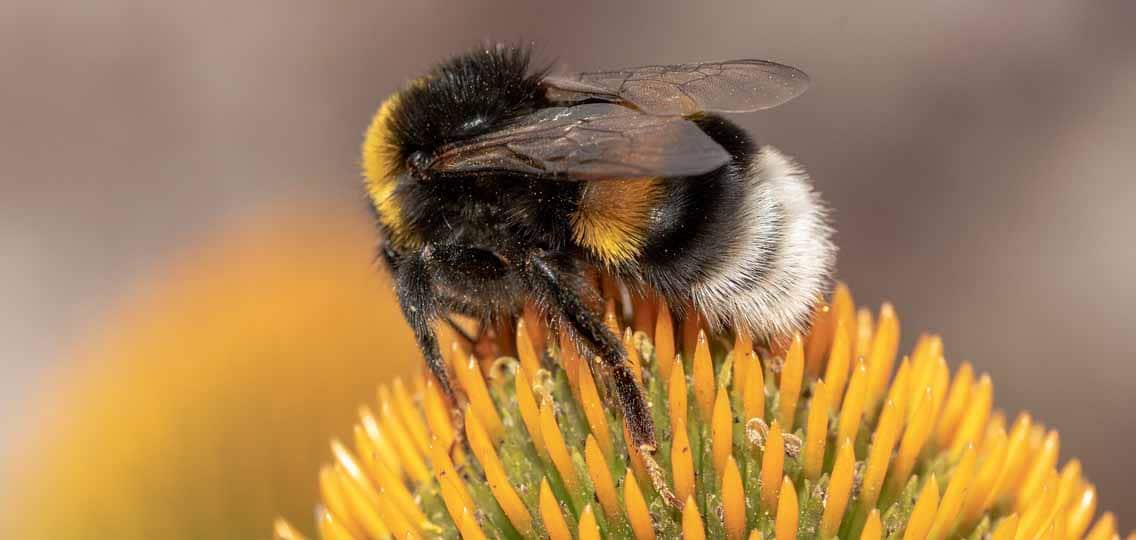Groups in court over neonicotinoid pesticide linked to declining pollinator populations
TORONTO — Environmental groups are in Federal Court today to protect pollinators from a harmful neonicotinoid pesticide, Thiamethoxam, by challenging the lax oversight of Health Canada’s Pest Management Regulatory Agency (PMRA). Lawyers from Ecojustice representing the David Suzuki Foundation, Friends of the Earth Canada, Ontario Nature and the Wilderness Committee will argue that certain Thiamethoxam pesticides are unlawfully registered in Canada.
“We’re in court today because the PMRA has failed to live up to its legal responsibilities as a regulator,” said Ecojustice lawyer Charles Hatt. “For more than a decade the Minister of Health has approved Thiamethoxam pesticides while the PMRA’s own scientists acknowledged they lacked the science necessary to assess the pesticides’ risks to pollinators and the environment. This act first, ask questions later approach obviously undermines Canada’s pesticide laws.”
The groups point out that the Pest Control Products Act requires the Minister to have “reasonable certainty” that a pesticide will cause no harm to the environment before registering it. For more than a decade, the Minister has granted a series of so-called “conditional registrations” for neonicotinoid pesticides, putting off the review of scientific information on the pesticide’s risks to pollinators. Over this period neonicotinoids have become widely used in Canadian agriculture, dramatically increasing exposure and risk for pollinators and other insects.
“Canada has taken years to get information about risks to pollinators and study the data while allowing widespread use of neonicotinoids to continue, and this has jeopardized pollinator health,” said Lisa Gue, Senior Researcher and Analyst at the David Suzuki Foundation.
Caroline Schultz, Executive Director at Ontario Nature added: “Pollinators are key players in our ecosystems, and their declines are terrifying. Fruits, vegetables, nuts, and 90 per cent of flowering plants need pollinators to reproduce and thrive. We’re hoping that our court case will compel the federal government to follow the common-sense actions of other jurisdictions and protect pollinators in Canada before it’s too late.”
In April 2018, members of the European Union voted to ban Thiamethoxam and other neonicotinoids from all outdoor agriculture because of the risks to bees and other pollinators. While Canada’s PMRA is now proposing to phase out most uses of Thiamethoxam to protect aquatic invertebrates, the proposal has yet to be finalized. Even if this proposal is finalized the pesticides would be allowed to remain in use until at least 2023-2026, or later.
“The use of neonicotinoids in Canadian agriculture is known to cause declines in pollinator populations and now, we know they are harmful to aquatic insects important to birds and fish,” said Beatrice Olivastri, Chief Executive Officer at Friends of the Earth Canada. “Neonicotinoids are a bad bet for nature – birds, bees and fish. We have to go to court to insist Canada act on the basis of science to protect the environment from neonics. It’s time for Canada to work with farmers who want to protect the environment rather than making deals with pesticide manufacturers.”
Neonicotinoids are systemic chemical insecticides that are found in all tissues of treated plants, including pollen and nectar. This class of toxic pesticides poses threats to “non-target organisms” like native bees, which are responsible for pollinating one-third of the world’s crops. Neonicotinoids used in agriculture are also being found in surrounding wildflowers and watercourses, increasing toxic exposure for insects throughout the environment.
“Pollinator populations are plummeting and the science tells us that neonicotinoids play a big role in that decline. So why is the PMRA continuing to allow their use and sale?” said Charlotte Dawe, Conservation and Policy Campaigner at the Wilderness Committee. ‘We’re asking the court to declare the registrations of these Thiamethoxam-based pesticides invalid and send a clear message that the PMRA’s practice of approving first and studying the science later cannot continue.”
-30-
ABOUT
Ecojustice, Canada’s largest environmental law charity, goes to court to defend nature, combat climate change, and fight for a healthy environment for all.
The David Suzuki Foundation’s mission is to protect the diversity of nature and our quality of life, now and for the future.
Friends of the Earth Canada is the Canadian member of Friends of the Earth International, the world’s largest grassroots environmental network, campaigning in 75 countries on today’s most urgent environmental and social issues.
Wilderness Committee is Canada’s people-powered, citizen-funded wilderness protection group.
Ontario Nature protects wild species and wild spaces through conservation, education and public engagement.

